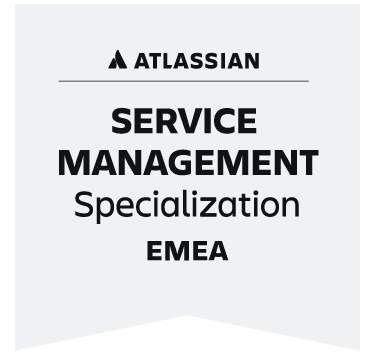Companies need powerful tools to manage customer requests, optimize internal processes and keep track of their IT infrastructure. While Jira Service Management from Atlassian is a popular solution, there are a number of alternatives on the market. But which service management platforms are available and which should I use? In this article, we compare Jira Service Management vs ServiceNow vs Zendesk.
Table of contents
- Jira Service Management (JSM)
- Increase employee autonomy, meet compliance standards and create transparency with our central information platform.
- ServiceNow
- Zendesk
- Service management platforms at a glance: Jira Service Management vs ServiceNow vs Zendesk
- Conclusion: Is there the best service management platform?
Jira Service Management (JSM)
Jira Service Management is an IT Service Management (ITSM) platform from Atlassian that is designed to support IT teams in providing fast and efficient services. It integrates incident management, problem management, change management and asset management in one centralized solution.

The platform offers self-service portals for end users, automated workflows to optimize service processes, extensive reporting and analytics capabilities, and the ability to adapt to various ITSM frameworks such as ITIL. JSM enables seamless collaboration between IT operations and development teams, supports agile methodologies and integrates with other Atlassian products and third-party tools to provide a holistic view of the IT service lifecycle.
Advantages:
- Tight integration with other Atlassian products and open API interface to other apps and platforms
- Customizable workflows and automation (e.g. for process digitization/automation)
- Extensive reporting and analysis functions
- Scalability for growing companies
- AI-supported virtual agent/platform to answer frequently asked questions directly and support interactions automatically
- Integration with Confluence allows you to create a comprehensive support portal and help center
- Comprehensive enterprise service management
Disadvantages:
- Steep learning curve for new users
- Can be oversized for small teams
- Limited native functions for asset management
Who is Jira Service Management suitable for?
Jira Service Management is particularly suitable for medium-sized to large companies, especially those with a strong focus on software development and IT service management.
It is ideal for organizations that require close integration between development and service departments. With Jira Service Management it is also possible to create self-services (Employee Self-Service; ITSM; Customer Support) for teams and can be configured for a variety of specific use cases (e.g. Developer Self-Service).
When is Jira Service Management the best choice?
Atlassian ecosystem:
If your company already uses other Atlassian products such as Jira Software, Confluence or Bitbucket, Jira Service Management offers seamless integrations. This enables a smooth flow of information between development, operations and service teams, which significantly increases collaboration and efficiency.
Complex, customizable workflows:
For organizations with specific or complex service processes, Jira JSM offers highly customizable workflows. You can design processes for incident management, problem management, change management and more according to your exact needs. This enables precise mapping of your internal processes and best practices.
DevOps integration:
If you are aiming for close integration between development and service management, JSM is ideal. It enables a direct link between service requests and development tasks, which shortens response times and improves communication between teams. This effectively supports agile and DevOps practices.
Extensive integration options:
Jira Service Management offers a variety of integrations to common tools and platforms. This includes:
- Cloud services: Seamless integration with Azure and AWS for a cloud-based service management platform.
- Microsoft products: Connections to Microsoft Teams, Office 365 and other Microsoft tools for improved productivity.
- Communication tools: Integration with Slack for quick notifications and collaboration.
- Monitoring tools: Connection to monitoring tools for automated incident creation.
- More apps: An extensive ecosystem of third-party apps in the Atlassian Marketplace extends the functionality as required.
These integration capabilities allow Atlassian's tool to be used as a central hub for your entire IT service infrastructure, increasing efficiency and providing a unified view of all service-related activities.
Prominent features
- Customizable service desks and customer portals
- Incident, problem and change management
- SLA tracking and management
- Extensive automation options
- Best practices templates for service desks such as HR, marketing, sales, legal, etc.
Integrations and Marketplace
The service management platform benefits from the extensive Atlassian Marketplace with over 3,000 apps and integrations. This enables the system to be highly customizable and expandable.
Find out more about self-services with JSM
Increase employee autonomy, meet compliance standards and create transparency with our central information platform.
Artificial intelligence (AI)
With the integrated AI engine that utilizes powerful speech technology and generative AI, a JSM virtual agent provides agents and help seekers alike with fast conversational support.
- Templates for intentions: Efficiently create support scenarios based on common problems and historical ticket data.
- AI answers Beta: Use generative AI to answer queries automatically, supported by your knowledge base and Atlassian Intelligence.
- Automated web requests: Reduce ticket escalations by automating common actions such as software access requests.
- Analyzes: Monitor and optimize the performance of your virtual agent with detailed insights.
- Low/No-Code-Workflow-Builder: Implement new workflows quickly thanks to the user-friendly interface and ready-made templates.
- Chat environment: Provide personalized, interactive support in a modern chat interface.
Intelligent ticket categorization, prompt answers to frequent questions and targeted forwarding of complex cases to experts minimize response times and improve customer satisfaction.
The seamless integration into Jira and the adaptability to company-specific requirements make these AI agents a valuable asset for companies that want to optimize their service processes and reduce operating costs at the same time.
ServiceNow
ServiceNow is a cloud-based platform for digital workflows that focuses on the automation and optimization of business processes.

ServiceNow offers a comprehensive solution for IT Service Management (ITSM), Customer Service Management (CSM), HR Service Delivery and other business functions. The service management platform enables companies to digitize, automate and optimize workflows to increase efficiency and improve service quality.
Core capabilities include incident management, problem management, change management, asset management, and self-service portals for end users. ServiceNow also supports AI-powered automation, predictive intelligence and advanced analytics for data-driven decision making.
Advantages:
- Comprehensive solution as an enterprise service management platform
- Strong business process automation skills
- Robust reporting and analysis functions
- High scalability for large companies
Disadvantages:
- High complexity and implementation effort
- Relatively high costs, especially for smaller companies
- May be oversized for simple service desk requirements
Who is ServiceNow suitable for?
ServiceNow is ideal for large companies and corporations looking for a comprehensive platform for the digitalization and automation of their business processes. It is particularly suitable for organizations with complex IT infrastructures and cross-divisional service requirements.
When is ServiceNow the best choice? When ...
Holistic enterprise service management:
... you need a comprehensive platform that goes beyond IT and integrates services for HR, finance, facility management and other departments. ServiceNow offers a unified approach to enterprise-wide service management.
Cross-departmental automation:
... you want to automate complex, cross-departmental workflows. The platform enables the creation and management of end-to-end processes that span multiple business units, increasing efficiency and consistency.
Scalability for large companies:
... you are looking for a solution for a large, possibly globally active company. ServiceNow is designed to manage enormous amounts of data and users without sacrificing performance. It offers robust governance and compliance features that are essential for large organizations.
Advanced analysis functions:
... you need detailed insights and predictions for your service processes. ServiceNow's AI and machine learning capabilities enable predictive analytics and data-driven decision making at an enterprise level.
Adaptability and expandability:
... you need a highly customizable platform that can be adapted to specific and changing business requirements. ServiceNow offers extensive options for customizing and extending functionality.
Prominent features
- IT Service Management (ITSM) and IT Operations Management (ITOM)
- Customer Service Management
- HR Service Delivery
- Governance, Risk, and Compliance (GRC)
- Custom App Development
Integrations and Marketplace
ServiceNow offers its own app store with a wide range of integrations and extensions. It also supports numerous out-of-the-box integrations with common enterprise applications.
Artificial intelligence
ServiceNow relies heavily on AI and machine learning with its "Now Intelligence" platform. These AI capabilities include:
- Virtual agents for improved customer service
- Predictive intelligence for forecasting trends and problems
- Automatic categorization and routing of requests
- AI-supported decision support for employees
Zendesk
Zendesk is a cloud-based customer service management platform that focuses on improving customer relationships and experiences.

Zendesk offers a suite of products for customer service, sales support and customer loyalty. The platform enables companies to manage and respond to customer inquiries via various channels such as email, telephone, chat, social media and self-service portals.
Key features include ticketing system, live chat, knowledge bases, community forums, customer satisfaction surveys and analytics tools. Zendesk also offers AI-powered automation for faster response times and personalized customer interactions.
Zendesk aims to simplify and improve customer service by bringing together all customer-relevant information and interactions in one central location.
Advantages:
- User-friendly interface and simple setup
- Strong focus on customer service and experience
- Flexible pricing for different company sizes
- Extensive multichannel support
Disadvantages:
- Less comprehensive ITSM functions compared to specialized tools
- Limited customization options for complex workflows
- Limited functions for asset and configuration management
Who is Zendesk suitable for?
Zendesk is particularly suitable for small to medium-sized companies that have a strong focus on customer service. It is also a good choice for companies looking for a user-friendly solution that covers both external customer support and internal IT support requirements.
When is Zendesk the best choice? When ...
Customer service focus:
... you focus primarily on improving customer service and need specialized tools to do so.
Easy to use:
... you are looking for a user-friendly solution that is quick to implement and easy to learn.
Scalability:
... you need a flexible platform that can grow with your business, from startups to large organizations.
Omnichannel support:
... you want to centrally manage customer interactions via various channels (e-mail, chat, telephone, social media).
Self-service:
... you want to enable customers to find answers on their own, e.g. via knowledge databases.
Prominent features
- Ticketing system for customer service and IT support
- Knowledge database and self-service portal
- Multichannel support (e-mail, chat, telephone, social media)
- Customer analysis and reporting
Integrations and Marketplace:
Zendesk offers a marketplace with over 1,000 apps and integrations. This enables good expandability and integration into existing company applications.
Artificial intelligence:
Zendesk uses AI in various areas of its platform:
- Answer Bot for automated customer responses
- AI-supported ticket allocation and prioritization
- Sentiment analysis for customer interactions
- Predictive analytics to improve customer service performance
Service management platforms at a glance: Jira Service Management vs ServiceNow vs Zendesk
Each of the tools presented has its own strengths and is ideally suited to different scenarios: The service management platforms: JSM vs ServiceNow vs Zendesk in comparison.
| Criterion | Jira Service Management: | ServiceNow | Zendesk |
|---|---|---|---|
| Main target group | Medium-sized to large companies with an IT focus | Large companies and groups | Small to medium-sized companies |
| Particularly suitable for | Companies in the Atlassian ecosystem. (But can also be used as a stand-alone solution) | Complex, cross-divisional service requirements | Customer service-oriented companies |
| Strengths | Integration with Atlassian products & most used apps Customizable workflows Scalability | Comprehensive enterprise solution Strong process automationRobust analyses | User-friendlinessMultichannel support Flexible pricing |
| Weaknesses | Steep learning curve Complex for small teams | High complexity High costs | Limited ITSM functions Limited customizability |
| Prominent features | Customizable service desks Incident, Problem, Change Management SLA tracking ITSM, ESS, HR, Customer Support (all known use cases can be covered with JSM) Services desk templates for a quick start | ITSM and ITOM Customer Service Management HR Service Delivery Governance, Risk & Compliance (GRC) | Ticketing systemKnowledge databaseMultichannel support |
| Integrations | Extensive Atlassian Marketplace with integrations to all/most used tools & applications | ServiceNow App Store | Zendesk Marketplace |
| AI functions | Atlassian Intelligence for automation and predictions; AI agents for specific use cases already available as templates | Now Intelligence for virtual agents and predictive analytics | Answer Bot and AI-supported analyses |
| Implementation effort | Medium to high | High | Low to medium |
| Pricing | Free of charge up to 3 agents with limited functions; standard from $17.65/agent/month | From $100/month | From $19/month for small teams |
Conclusion: Is there the best service management platform?
Jira Service Management: is the best choice for organizations that already work in the Atlassian ecosystem or require tight integration between development and service management. It offers flexible customization options and is particularly suitable for IT-focused organizations.
ServiceNow is the most comprehensive solution and is best suited for large organizations with complex, cross-functional service requirements. It offers the most advanced automation and AI capabilities, but also requires the highest implementation effort.
Zendesk is ideal for companies that have a strong focus on customer service and are looking for a user-friendly solution that can be implemented quickly. It offers a good balance between customer service and IT support functions, but is less comprehensive in its ITSM capabilities than the other two options.
When choosing the right service management platform, companies should consider their specific requirements, resources and long-term goals. Factors such as the size of the company, the complexity of the IT infrastructure, the focus on customer service versus internal IT processes and the available budget all play a decisive role.
Regardless of the choice, it is important that the selected tool offers the opportunity to grow with the company and adapt to future requirements. The integration of AI functions will become increasingly important in the future in order to increase efficiency and service quality.







